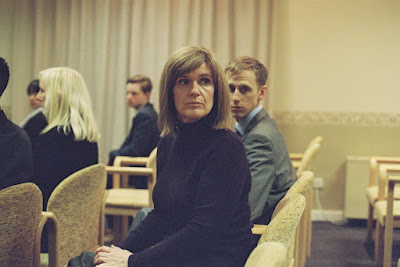It's taken a period of reflection - and resulted in no less than three God's Not Dead films - but finally we seem to have worked out how to elevate the faith-based movie to something worthy of a cinema screen. There are laws, which we should perhaps have inscribed in stone tablets for our descendants to pore over. Firstly: there is little to no dramatic value in following characters who are true believers at the start of your film and true believers at the end of it (as per those God's Not Deads); there must, as in life, be some measure of uncertainty in between. Secondly: the very idea of faith only really becomes interesting when it's set against and challenged by the real world. The promising British debut Apostasy enters arthouse cinemas that have just been vacated by First Reformed, Paul Schrader's searching study of a priest cracking under the pressure of the daily parade of horrors; its title will already be familiar to admirers of Martin Scorsese's Silence, which reintroduced cinemagoers to the somewhat arcane concept of renouncing one's religious beliefs. Writer-director Daniel Kokotajlo, raised as a Jehovah's Witness, has drawn on his own experiences to give us this greatly more contemporary piece, set in an unidentified Northern town where Poundland is very much visible through the drizzle, and a life-or-death split becomes apparent in the ranks of a family steeped in the Christian sect's teachings.
In the beginning, there is a mother (Siobhan Finneran) and her two daughters. (Where the father has disappeared to is one of the film's mysteries; there may be so much religion in this household that it has no further need or room for another Godhead.) Oldest daughter Luisa (Sacha Parkinson) has reached her early twenties, and is beginning to drift away from the flock - towards friends, gigs, a relationship with somebody other than Jehovah. Her sister Alex (Molly Wright), just turned eighteen as we join events, is very much her sternly conservative mother's girl, on the other hand. When mum proposes a love match with Steven (Robert Emms), a milquetoast new elder at the church where the family worship, Alex all too meekly submits, no matter that this pairing might look to non-believers like a way of neutralising the girl's nascent curiosity and tying her down. (One rebel in the clan would seem to be enough.) God, in whatever form you care to imagine Him, has other plans, however: the film's dramatic grip derives from watching ordinary people having their core beliefs severely tested by the mysterious, sometimes fathomless ways of the universe.
For much of these 95 minutes, you can feel Kokotajlo himself weighing his own feelings about the world from which he stepped back. He's prepared, at least, to concede there may be some validity, wisdom and comfort in these teachings, as illustrated by the Bible quotes he inserts as chapter headings ("Each one is tried by being drawn out and enticed by his own desire"). It's the physical shape of the film that feels most damning. Projectionists who screened the Schrader film will scarcely need to reset their equipment: Apostasy has been shot in a narrow aspect ratio that, coupled with cinematographer Adam Scarth's muted palette, catches the evident limitations of this cloistered, unworldly existence. Here are people waiting for the second coming as if waiting for a bus in a municipal station left unrefurbished for decades; the quaint quietude of these locations allows words - and The Word above all - to hang heavy in the musty air above the characters' heads. (One simple yet dramatically effective touch: Kokotajlo permits us to hear what are offered up as silent prayers out loud, providing us with unfiltered status updates for this family's mortal souls.)
What Apostasy rejects is that blood-and-thunder melodrama - a feature of The Book - which survived into Mel Gibson's Christ movies, the God's Not Deads and perhaps even the Schrader film's finale: it's just possible Kokotajlo chose a squarish frame to shear off that 25% of the screen that might be deemed frivolous. When a major, life-altering event occurs, it's not only kept offscreen, but rationalised by these characters as part of some higher plan, where you or I might at the very least be inclined to shake a fist at the fates. The approach requires considerable control, both narrative and formal; it's one of those debuts that will leave an impression without once appearing in any way showy. Yet I occasionally wondered whether Apostasy's integral dourness might be an issue for some: from first branflake-coloured image to last, it remains a determinedly earthbound film, where Schrader and Scorsese pushed onwards and upwards towards the transcendent. The performers may be the element that hold you, particularly Finneran, who initially seems as remote and irredeemable as Piper Laurie in Carrie, but suddenly becomes fascinating in the second half, as she fumblingly tries to find an expression of love that isn't tied up with the end of the world. This is Kokotajlo's notable achievement here: to extrapolate deeply internalised processes, finding the human within the dogma, the doubt inside the belief.
Apostasy is now screening in selected cinemas, and is available to stream via Curzon Home Cinema and the BFI Player.

No comments:
Post a Comment